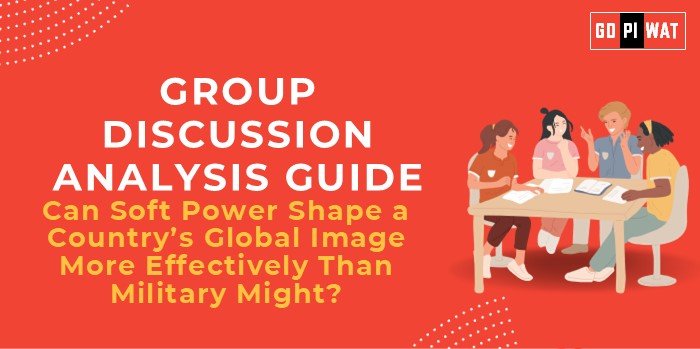📋 Group Discussion Analysis Guide: Can Soft Power Shape a Country’s Global Image More Effectively Than Military Might?
🌐 Introduction to the Topic
- 📌 Opening Context: In an interconnected world, the perception of power is as crucial as its application. Nations increasingly deploy cultural diplomacy, economic partnerships, and international influence as soft power tools to build their global image.
- 📖 Topic Background: The concept of soft power, introduced by Joseph Nye in 1990, emphasizes influence through attraction rather than coercion. While military might has historically defined power, soft power offers a subtler, sustainable pathway for shaping global narratives.
📊 Quick Facts and Key Statistics
🌍 Global Military Spending: $2.24 trillion in 2023, led by the US, China, and Russia (SIPRI, 2023).
🌟 Soft Power Ranking: Germany, Japan, and the UK lead in soft power metrics (Global Soft Power Index, 2023).
📚 Cultural Diplomacy: 10 million students studied abroad in 2022, creating cross-border cultural bridges (UNESCO).
🏛️ Tourism’s Role: France, a top soft power nation, hosted 80 million tourists in 2023.
🌟 Soft Power Ranking: Germany, Japan, and the UK lead in soft power metrics (Global Soft Power Index, 2023).
📚 Cultural Diplomacy: 10 million students studied abroad in 2022, creating cross-border cultural bridges (UNESCO).
🏛️ Tourism’s Role: France, a top soft power nation, hosted 80 million tourists in 2023.
👥 Stakeholders and Their Roles
- 🏛️ Governments: Promote policies that showcase national culture, values, and ideologies.
- 🌍 Cultural Institutions: Spread influence through programs like Fulbright Scholarships or Confucius Institutes.
- 📺 Media and Entertainment: Export cultural products (e.g., Hollywood, K-pop).
- 🌱 International Organizations: Enhance soft power through humanitarian aid and diplomacy (e.g., UN, WHO).
🏆 Achievements and Challenges
✨ Achievements:
- 🎵 Cultural Influence: South Korea’s global image boosted by K-pop and cinema.
- 🌍 Humanitarian Diplomacy: India’s vaccine diplomacy strengthened ties during COVID-19.
- 📈 Economic Leadership: Germany’s global image as an economic powerhouse.
⚠️ Challenges:
- 🔄 Dependency on Perception: Soft power’s impact relies on consistent and authentic branding.
- ⚔️ Crisis Management: Military might often remains a fallback for immediate conflicts.
- 📉 Erosion of Credibility: Soft power wanes if policy contradicts promoted values (e.g., human rights violations).
🌍 Global Comparisons:
- ✔️ Success: The Nordic model (Sweden, Norway) combines cultural diplomacy with high human development metrics.
- ❌ Challenge: The US struggles with global perceptions despite its cultural dominance.
Case Studies:
- 🇨🇳 China: Belt and Road Initiative (soft power) vs. Taiwan tensions (military might).
- 🇦🇪 UAE: Shift from oil-based influence to soft power through tourism and cultural investments.
📢 Structured Arguments for Discussion
- ✅ Supporting Stance: “Soft power builds long-lasting relationships and trust that military might cannot achieve.”
- ❌ Opposing Stance: “Military strength ensures national security and provides leverage that soft power alone cannot.”
- ⚖️ Balanced Perspective: “Soft power shapes perceptions over time, while military might addresses immediate threats. An effective blend ensures a balanced global image.”
🧠 Effective Discussion Approaches
- 🎯 Opening Approaches:
- Start with examples of successful soft power campaigns (e.g., the UK’s Royal Family as a cultural symbol).
- Highlight a statistic contrasting global military spending with soft power outcomes.
- 🤝 Counter-Argument Handling:
- Acknowledge military might’s role in hard security but argue its limited long-term influence.
- Emphasize case studies where soft power significantly altered global perceptions (e.g., Germany post-WWII).
📊 Strategic Analysis of Strengths and Weaknesses
- Strengths: Builds trust, fosters partnerships, sustainable and cost-effective.
- Weaknesses: Requires consistent effort, limited in crisis resolution.
- Opportunities: Leverage digital platforms, invest in global education initiatives.
- Threats: Rising nationalism, counter-propaganda.
🎓 Connecting with B-School Applications
- 💼 Real-World Applications: Case studies on branding, crisis management, and global diplomacy in business strategy.
- 📚 Sample Interview Questions:
- “How can soft power help businesses in global market entry?”
- “What lessons can corporations learn from soft power strategies?”
- 💡 Insights for Students:
- Brand positioning parallels soft power strategies.
- Crisis management insights from global diplomacy.
- Understanding cultural influences in business.


